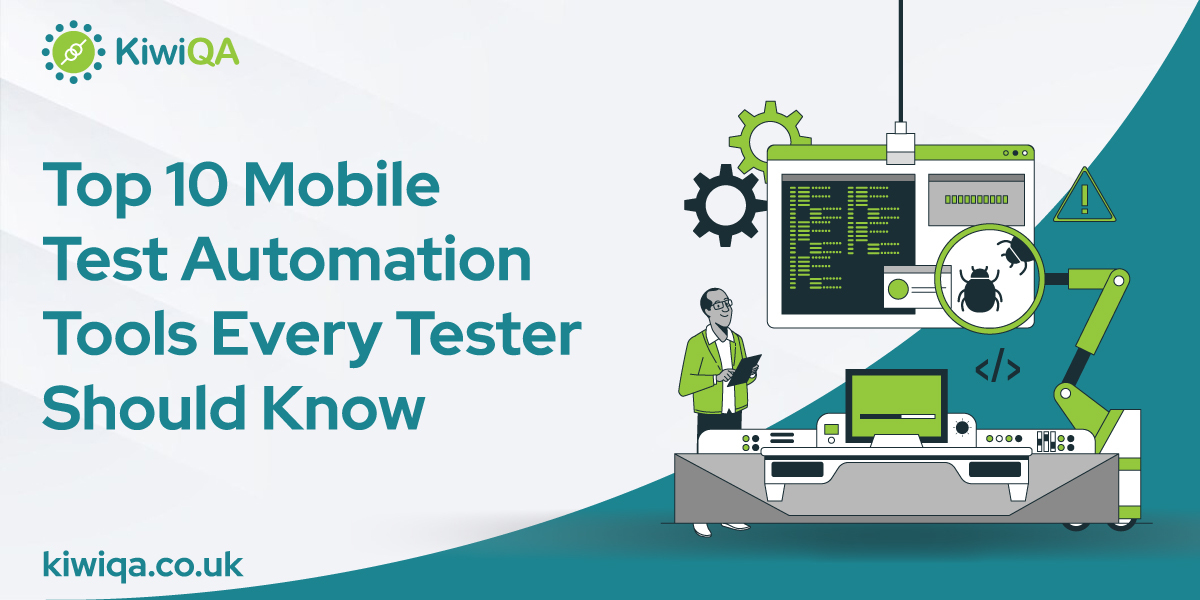There are multiple mobile testing automation tools in the market, but figuring out which tool is ideal for you is challenging. Mobile app Automation Testing Services are necessary for verifying the mobile application functionality, quality, and user experience across multiple devices & OS. With the rapid competition in the mobile application industry, selecting the ideal mobile app testing services provider helps you automate the testing procedure.
If you want to deliver a seamless application to the users, you must know the top 10 tools in the market. The following guide shares the top 10 mobile app test automation tools in 2024.
1. Appium

Overview of Appium
This popular open-source mobile test automation tool is employed for testing Android & iOS applications. It uses the WebDriver interface and can operate with whatever framework, devices, or techniques you desire.
Key Features of Appium
• It is a multi-platform tool.
• Appium supports source code reuse across the Android and iOS ecosystems and integrates with other testing frameworks like TestNG and JUnit.
Pros and Cons of Appium
Pros:
• Easy integration.
• It contains comprehensive documentation.
• The software is open-source.
Cons:
• The user interface requires work.
2. Calabash

Overview Of Calabash
Calabash is a systematic acceptance testing framework developed by Xamarin that includes two open-source libraries for iOS & Android. Calabash is used to automate the functional testing of native and hybrid mobile apps. It works well with Ruby, Java, .NET, Flex, & many other languages of programming.
Key Features Of Calabash
• Calabash has coverage testing analysis, which may help you assess how effectively your tests cover the application’s code.
• Calabash has mobile-specific features such as imitating gestures and validating the display of components on the screen.
• Calabash enables programmers to test applications on actual devices, resulting in an improved representation of how the program will perform in real-world circumstances.
Pros and Cons Of Calabash
Pros:
• Processes become more resilient.
• Reduced labor expenditures.
Cons:
• The expense of test maintenance is high when using playback techniques.
• Maintaining test data files becomes tough when the test script checks more screens.
Also Read: Quality Assurance Metrics That Matter In Healthcare Application Testing
3. Robotium
Overview of Robotium
Robotium is a free-to-use mobile app test automation tools framework created specifically for Android UI testing. It is appropriate for mobile automated testing across various Android & sub-versions. Robotium is utilized to automate black box testing of Android applications using TestDroid Recorder. Robotium creates scripts for testing in Java. This tool allows test case developers to construct function, system, & user acceptability test scenarios that cover numerous Android operations.
Key Features of Robotium
• Supports all Android & subversions.
• Enables building black box scenarios separately.
• Seamlessly connects with the IDE.
• Supports flexibility for testing applications for Android.
• Provides a broad spectrum of testing capabilities.
• Simple to learn and execute.
Pros and Cons of Robotium
Pros:
• Fast case testing execution.
• Increased accessibility of test cases.
• Supports both native & hybrid applications.
Cons:
• Its abilities are restricted to Android.
• Non-customizable.
4. Espresso
Overview of Espresso
Espresso is a robust and best mobile test automation tool for developing Android UI tests created by Google. It provides adaptability and customization choices that meet the programmer’s demands. However, for inexperienced users, it might be a difficult tool to operate.
Key Features of Espresso
• Simple connection with popular technologies like Jira & Jenkins.
• Support concurrent testing to reduce time.
• Comprehensive test reports for improved analysis of findings.
• Built-in test management to prevent test errors.
• Intelligent execution of tests reduces negative results.
• AI-powered ideas for quicker test development and execution.
Pros and Cons of Espresso
Pros:
• Easy to Use
• Stable Testing
• Fast Feedback
• Development Is Easy
Cons:
• There is a danger of getting acclimated to the built-in test synchronization and user interface.
• It requires ease of access from the source code.
5. Kobiton
Overview of Kobiton
Kobiton is a mobile-focused testing solution that helps businesses accelerate their testing procedures. It has several automated testing capabilities, such as scriptless automation, graphical testing, and efficiency testing. Kobiton makes use of the Appium framework, which offers a consistent way to connect with different mobile devices and is often updated to improve its testing skills and performance.
Key Features of Kobiton
• Provides access to thousands of the newest products on a versatile real-device testing cloud, guaranteeing that applications are validated in real-world scenarios.
• Kobiton has complete support for several popular testing frameworks.
• Kobiton does extensive performance evaluations to uncover abnormalities such as CPU rises, battery loss, and delays.
• Kobiton offers mobile ongoing testing, self-healing scripts for tests, and connection with various CI/CD systems to provide an effortless process.
Pros and Cons of Kobiton
Pros:
• Real Device Accessibility
• Performance Insights
• Integration Flexibility
Cons:
• Does not support extended test runs.
• Unable to obtain beta versions.
6. Selendroid
Overview of Selendroid
Selendroid is a mobile test automation tool open source developed exclusively for Android apps. It may be utilized to automate the testing of native & hybrid Android apps and even mobile web apps.
Key Features of Selendroid
• Selendroid enables hot connecting of hardware components, ensuring that you may connect and unplug them from your Android device before restarting the app and device.
• It also has an inspector feature, which simplifies test case development.
• Selendroid can interact with numerous Android devices at the same time, enabling fast cross-platform testing & automation.
• It provides a smooth connection with JSON.
Pros and Cons of Selendroid
Pros:
• Primarily intended for Android.
• Supports automation in Python, Java, C, and Perl.
• Backward compatibility.
Cons:
• Low test rates.
• Advanced machine requirements.
• Unusable for computers with a minimum of 4 GB RAM.
7. Katalon Studio

Overview of Katalon Studio
Katalon Studio is an artificial intelligence-powered platform that offers an outstanding mobile testing solution for planning, creating, and executing automated tests. It provides click-and-run cloud-based settings for automating many types of mobile evaluation, including cross-functional testing.
Key Features of Katalon Studio
• Standout features include cross-environment execution, which allows you to run tests both locally and remotely.
• It has sophisticated features such as object surveillance and recording utilities.
Pros and Cons of Katalon Studio
Pros:
• Testing with actual gadgets and emulators.
• Test automation for native, web-based, mobile, and hybrid applications.
• It offers support to significant operating systems.
Cons:
• Complex set-up process.
• No support from the community.
Also Read: Top Test Management Tools For 2024: Enhance Your QA Process
8. Ranorex
Overview of Ranorex
Ranorex is a robust test automation tool for mobile apps that is simple to operate even for non-technical individuals, and it covers a diverse set of programming languages.
Key Features of Ranorex
• Supports both Apple and Android testing.
• Data-driven testing strategy.
• Integration of DevOps tools.
• Complete report with excellent results.
• Supports several technologies, including .NET, C#, HTML5, and Java.
Pros and Cons of Ranorex
Pros:
• Multi-Platform Testing
• User-Friendly UI
• Effective-In-Team Collaboration
Cons:
• Lacks macOS Support
• Irregular updates
9. Eggplant

Overview of Eggplant
Eggplant is a flexible solution for automated GUI testing on a variety of systems and languages. Its visual approach allows users to write a single script capable of smoothly automating a wide range of desktop, mobile, and online apps. This simplifies the testing procedure and increases performance.
Key Features of Eggplant
• Eggplant simplifies GUI testing with visual testing. Testers may simply record activities and produce test scripts.
• No programming knowledge is required.
• Eggplant may automate complicated tests involving several windows as well as tests requiring the user to connect to a database.
Pros and Cons of Eggplant
Pros:
• Testing over the largest variety of operating systems and devices.
• Users who lack extensive programming knowledge can conduct tests.
• Complete visibility of testing operations.
Cons:
• A cumbersome IDE and limited database testing capabilities.
10. Robot Framework
Overview of Robot Framework
Robot Framework is a test-automation framework designed for acceptance tests and development driven by tests (ATDD). It is a keyword-based testing platform that uses tabular test information syntax.
Key Features of Robot Framework
• It makes use of a basic and straightforward scripting language that can be comprehended by even inexperienced developers.
• The tool is very adaptable and extendable, making it excellent for the automation of a wide range of operations due to its ease of integration with other tools and settings.
• Robot Framework includes a variety of features like variables, cycles, conditions, & libraries.
Pros and Cons of Robot Framework
Pros:
• Ease of use
• Flexibility
• Acceptance testing and detailed reports
Cons:
• Limited coding capability.
• Lack of IDE functionality.
• Lack of support from the community.
• Poor execution speed.
Choosing the Right Tool for Your Needs
Selecting the appropriate Automation testing tool may have a significant impact on the standard of the finished result. Here are some points to remind you-
- Always use actual devices
While emulators & simulators are useful for the initial stages of testing, actual device tests are essential to comprehend actual performance. The mobile test automation tools open source should work effortlessly with each of them.
- Type of application being tested
The type of application being examined determines the proper testing framework. Native apps need technologies like Appium to emulate real-world user interactions. Web programs are best tested using frameworks that replicate browser interactions, such as Selenium.
- Cross-platform connectivity
As mobile applications grow more cross-platform, it’s critical to pick a mobile application test automation tool that works with numerous platforms, such as Android, iOS, and Windows. The tool should let you create tests at once and run them through several platforms.
- Budget
Test automation tools for mobile API testing may vary from free to high-cost business solutions.
- Adaptability
Opt for a mobile test automation technology that is more adaptable. Check that it can handle bigger test suites and has cloud monitoring features.
- Third-party connections
The application should be compatible with third-party tools such as JIRA, Trello, Slack, and GitHub, enabling teams to optimize their workflows and use current technologies.
Explore the Best Mobile Test Automation Tools Today!
Testing personnel from Automation Testing Company UK must have access to the appropriate testing tools to assure the quality and dependability of their products. The leading 10 testing tools discussed in this post provide a diverse set of features and functions to help speed up the test procedure and provide excellent software. By correctly using these technologies, testers may increase productivity, speed, and, ultimately, the effectiveness of their testing operations. Hire the mobile app testing company today to get excellent results.
















Comments are closed.